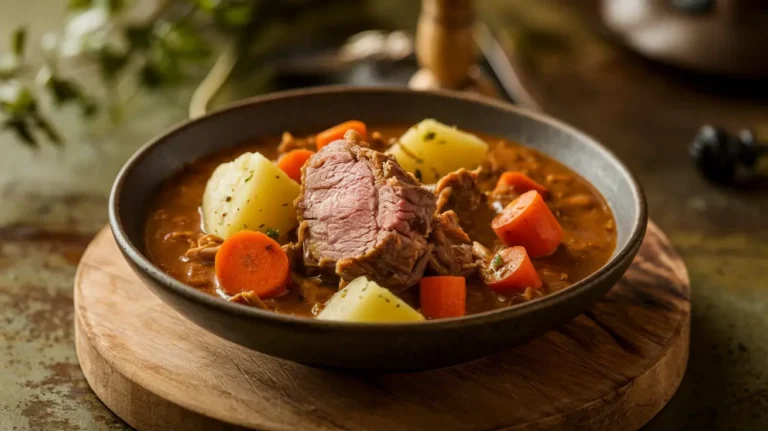Traditional Irish Stew Recipe: The Ultimate Comfort Food from Ireland
The Traditional Irish Stew Recipe is a timeless dish that has been enjoyed for generations. Known for its rich flavors, tender meat, and hearty vegetables, this classic Irish meal is a staple of comfort food. Made with simple ingredients like lamb, potatoes, onions, and carrots, this stew is slow-cooked to perfection, creating a warm and satisfying dish perfect for any occasion.
In this guide, we’ll walk you through the authentic way to prepare a Traditional Irish Stew Recipe, from selecting the best ingredients to step-by-step cooking instructions. Whether you’re celebrating St. Patrick’s Day or just craving a cozy meal, this stew is a must-try!
For more classic Irish dishes, check out this collection of traditional Irish recipes.
Table of Contents
The Origins of Irish Cuisine
Irish cuisine’s foundation lies in its agricultural bounty. Staples like potatoes, introduced in the late 16th century, became synonymous with survival and tradition. Dairy products, oats, and root vegetables also play a key role, while lamb and beef reflect Ireland’s pastoral lifestyle. The influence of British colonization, the Great Famine, and global trade shaped modern Irish dishes.
For more on Ireland’s culinary history, visit Traditional Food in Ireland with Recipe: A Taste of Irish Heritage.
Cultural Significance of Irish Dishes
Irish food is more than sustenance; it’s a celebration of community and tradition. Meals like Irish stew, soda bread, and boxty are passed down through generations, symbolizing resilience and unity. Food festivals like Galway International Oyster Festival further highlight the pride Ireland takes in its cuisine.
Global Influence
While Irish cuisine maintains its roots, modern chefs are reimagining classics with contemporary twists. Vegan and gluten-free adaptations ensure that traditional dishes cater to global tastes. This adaptability showcases the global appeal of Ireland’s culinary legacy.
Discover recipes and tips to reinterpret traditional dishes at Creative Pillsbury Dinner Ideas.
A Brief History of Irish Cuisine
Irish cuisine is a testament to the island’s resilience and adaptability. Its development reflects the challenges and influences of colonization, trade, and migration. Early Irish diets revolved around cereals, dairy, and seafood, thanks to the island’s fertile land and vast coastline. However, the introduction of the potato in the 16th century revolutionized the Irish diet, becoming a staple food for centuries.
The Great Famine (1845–1852) significantly impacted Ireland’s culinary history, leading to a shift in dietary habits and a migration of Irish food culture to other parts of the world. Modern Irish cuisine continues to evolve, blending traditional ingredients with global flavors.
For an in-depth look at Irish food heritage, explore Traditional Food in Ireland with Recipe: A Taste of Irish Heritage and Irish Food History.
Key Ingredients in Traditional Irish Dishes
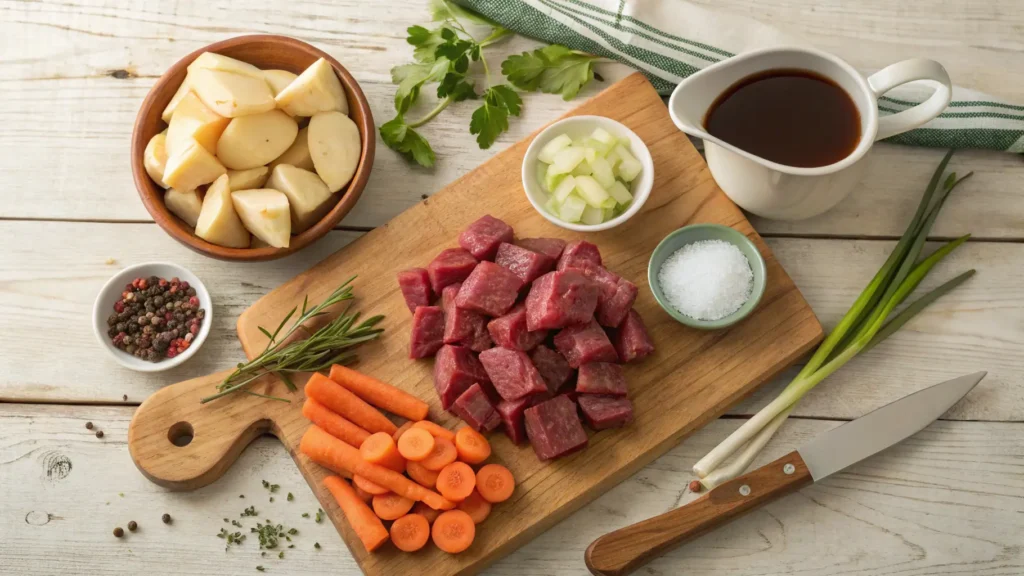
The foundation of Irish cuisine lies in its ingredients, which are fresh, simple, and locally sourced. Potatoes remain a symbol of Irish food, used in iconic dishes like Colcannon and Boxty. Lamb and beef, raised on lush pastures, are the centerpieces of hearty stews and roasts. Dairy products like butter, cream, and cheese are renowned for their rich flavors, while oats form the basis of porridge and bread.
Other staples include root vegetables, seafood, and apples, reflecting Ireland’s natural bounty. To enhance your understanding, visit Enhance Vegetable Flavors Naturally.
Cooking Methods in Irish Tradition
Traditional Irish cooking methods emphasize simplicity and bringing out the natural flavors of ingredients. Baking, a technique used for soda bread, highlights the use of Ireland’s high-quality dairy and flour. Stewing is a hallmark of dishes like Irish stew, combining root vegetables and tender meat for a warming, wholesome meal. Roasting, often reserved for lamb and beef, showcases the depth of flavor in Irish pastures.
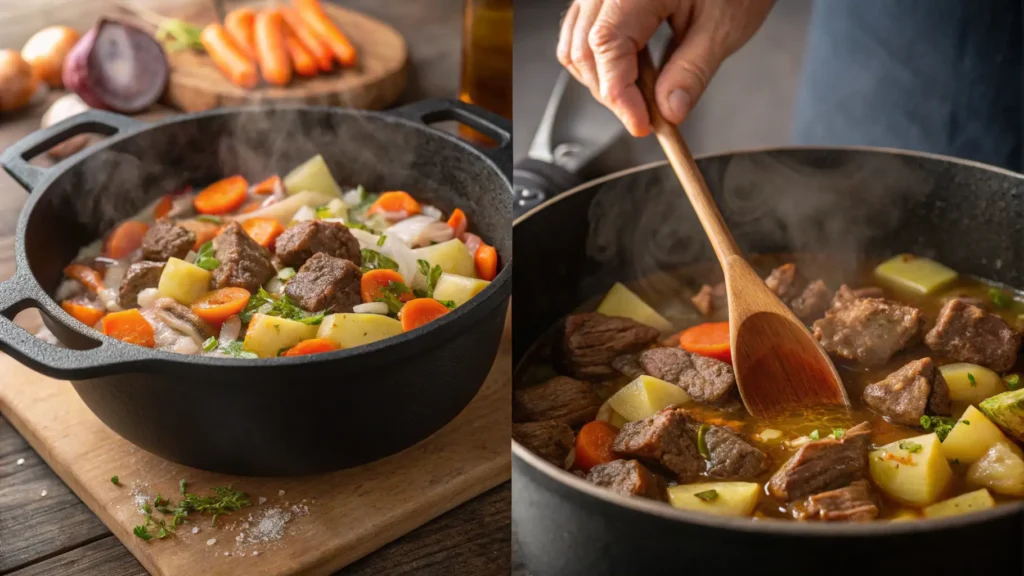
Explore tips for mastering these methods at Mastering Slow Cooking Recipes and Tips or Irish Culinary Techniques.
Iconic Irish Dishes You Must Try
Ireland is celebrated for its hearty and comforting cuisine, with iconic dishes that carry rich cultural significance. Each dish tells a story of resilience, tradition, and resourcefulness. From the warming Irish stew to the versatile soda bread, these recipes remain deeply ingrained in Irish culture and are cherished globally.
Irish Stew Recipe: A Hearty Classic
Irish stew is the quintessential comfort food, representing the essence of traditional Irish cooking. Made with tender lamb or mutton, root vegetables like carrots and parsnips, and a simple broth, this dish highlights Ireland’s reliance on hearty, locally available ingredients.
Ingredients:
- 2 lbs of lamb, diced
- 4 large potatoes, peeled and quartered
- 3 carrots, sliced
- 1 large onion, chopped
- 4 cups of beef or lamb stock
- Fresh parsley for garnish
Instructions:
- Brown the lamb in a pot over medium heat.
- Add onions and cook until translucent.
- Layer the potatoes and carrots, pour in stock, and season with salt and pepper.
- Cover and simmer for 90 minutes, stirring occasionally.
- Garnish with parsley and serve warm.
Colcannon: Comfort in a Bowl
Colcannon is a beloved Irish dish combining mashed potatoes with kale or cabbage, butter, and cream. It’s a perfect side dish for Irish stews or roasts.
Variation Ideas:
- Replace kale with spinach for a milder flavor.
- Add green onions for extra zest.
Discover the recipe at Healthy Lunch Recipes for Teens.
Boxty: The Irish Potato Pancake
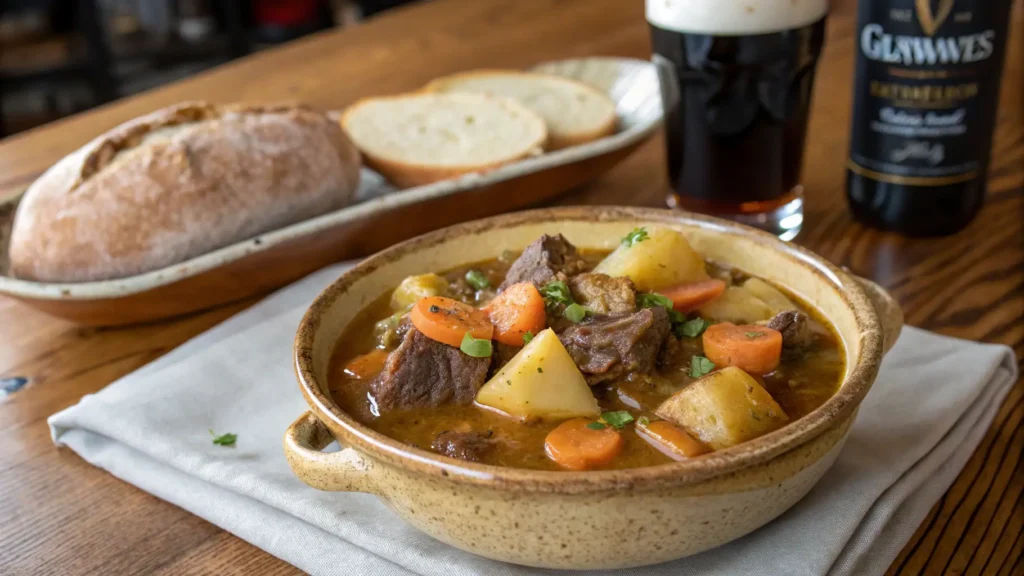
Boxty is a versatile potato pancake enjoyed as a breakfast dish or savory side. It’s made with grated potatoes, mashed potatoes, flour, and milk, then fried to golden perfection.
Serving Ideas:
- Top with sour cream and chives.
- Pair with smoked salmon for a modern twist.
Learn how to make Boxty at Creative Pillsbury Dinner Ideas.
Soda Bread: A Daily Staple
Soda bread is an iconic Irish quick bread made with just four ingredients: flour, baking soda, buttermilk, and salt. Its simplicity reflects Ireland’s frugal yet resourceful culinary traditions.
Recipe Tips:
- Use wholemeal flour for a rustic version.
- Add raisins for a sweet variation.
Read more about soda bread at Easy and Delicious Lamb Burger Recipe.
Modern Twists on Irish Classics
Contemporary chefs are breathing new life into Ireland’s culinary traditions by creatively reimagining classic recipes. From deconstructing traditional Irish stew to infusing global flavors into soda bread, these modern twists highlight the adaptability of Irish cuisine. By incorporating fresh ingredients, innovative techniques, and a touch of artistry, Irish dishes are now a fusion of heritage and innovation.
Explore more about modern Irish recipes at Creative Pillsbury Dinner Ideas and Modern Irish Cooking.
Vegan and Gluten-Free Options
With dietary preferences evolving, many traditional Irish recipes are being adapted to suit vegan and gluten-free lifestyles. Vegan Irish stew replaces lamb with hearty mushrooms and lentils while maintaining the signature flavors of the dish. Gluten-free soda bread uses almond or oat flour, providing a healthier alternative to the classic recipe.
Recipe Ideas:
- Vegan Colcannon: Substitute butter with plant-based alternatives and add kale or spinach for a nutrient-rich twist.
- Gluten-Free Boxty: Use rice flour or gluten-free all-purpose flour to achieve the same crispy texture.
For inspiration, visit Best Gluten-Free Dinner Recipes and Vegan Adaptations.
Pairing Irish Dishes with Beverages
Pairing the right drink with Irish dishes enhances the dining experience. Traditional pairings like Irish stout with soda bread or a robust red wine with lamb stew are timeless. Modern pairings, however, include craft ciders, herbal teas, or non-alcoholic sparkling beverages for those seeking alternative options.
Suggestions:
- Irish Stew: Pair with a malty Irish ale or a light Pinot Noir.
- Boxty: Complement with a crisp apple cider.
- Colcannon: Enjoy with a warm cup of chamomile tea.
For more beverage ideas, explore Delicious Drink Recipes and Modern Beverage Pairings.
Preserving Ireland’s Culinary Heritage
Ireland’s culinary heritage is a vital part of its cultural identity. Efforts to preserve traditional recipes and promote Irish food are gaining momentum, led by passionate chefs, local communities, and national organizations. These initiatives aim to keep the rich flavors of Ireland alive while adapting to modern tastes.
Traditional cooking schools, such as Ballymaloe Cookery School, play a significant role in teaching time-honored techniques and showcasing locally sourced ingredients. Additionally, Irish food tourism, like the Wild Atlantic Way food trails, invites visitors to experience authentic dishes while connecting with their origins.
Support for sustainable farming and local artisans further strengthens Ireland’s culinary roots. Programs like Good Food Ireland actively promote the use of homegrown ingredients and authentic recipes.
Festivals and Events Celebrating Irish Cuisine
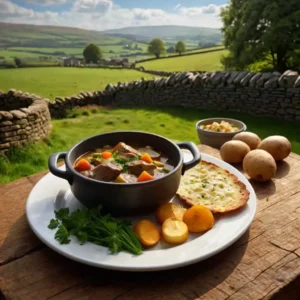
Irish food festivals are vibrant celebrations of the nation’s culinary traditions. These events bring communities together, spotlight local produce, and allow visitors to savor iconic dishes.
Notable Festivals:
- Galway International Oyster Festival: Celebrating Ireland’s seafood heritage, this event features fresh oysters, live music, and cookery demonstrations.
- Dingle Food Festival: A showcase of artisanal food and drink, complete with tasting trails through the picturesque town of Dingle.
- Savour Kilkenny Food Festival: This festival combines food and history, offering workshops, pop-up dinners, and farmer’s markets.
These festivals not only honor Ireland’s culinary past but also inspire a new appreciation for its enduring food traditions. By fostering a love for Irish cuisine, they ensure it remains a cherished part of the nation’s cultural legacy.
FAQs: Common Questions About Irish Food
1. What is the most famous traditional Irish dish?
Irish stew is arguably the most famous dish. Made with lamb, root vegetables, and a savory broth, it’s a comforting and hearty staple of Irish cuisine.
2. Why are potatoes so important in Irish cuisine?
Potatoes became a staple in Ireland during the 16th century due to their adaptability to the Irish climate and their role as a primary food source. Today, they remain central to dishes like Colcannon and Boxty.
3. What drinks pair well with Irish food?
Traditional drinks like Irish stout and whiskey are classic pairings. Modern options include craft ciders and herbal teas. Pair Irish stew with a malty ale or soda bread with a creamy stout.
Find pairing ideas at Delicious Drink Recipes.
4. Are there vegan or gluten-free Irish dishes?
Yes, many traditional recipes can be adapted. Vegan Irish stew substitutes mushrooms and lentils for meat, while gluten-free soda bread is made with almond or rice flour.
For adaptations, explore Best Gluten-Free Dinner Recipes.
5. What’s a unique aspect of Irish food culture?
Sharing meals is a cornerstone of Irish culture. From family dinners to festivals, food is a symbol of connection and community.
Conclusion: The Enduring Legacy of Irish Food
Ireland’s culinary traditions are a tapestry of history, culture, and innovation. From the iconic Irish stew to the globally cherished soda bread, these dishes embody the nation’s spirit and resilience. Modern chefs are reinterpreting classics while preserving their essence, ensuring Irish cuisine remains vibrant and relevant.
Through food festivals, sustainable practices, and global interest, Ireland’s rich culinary heritage continues to thrive. Whether it’s a comforting bowl of Colcannon or a pint of stout at a local pub, Irish food celebrates the simple joy of coming together over a shared meal.

